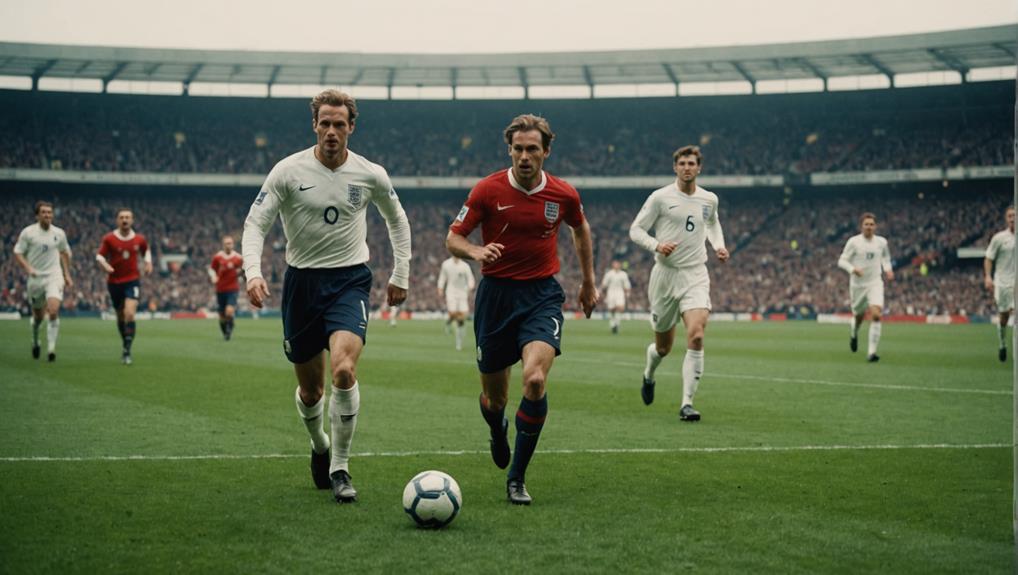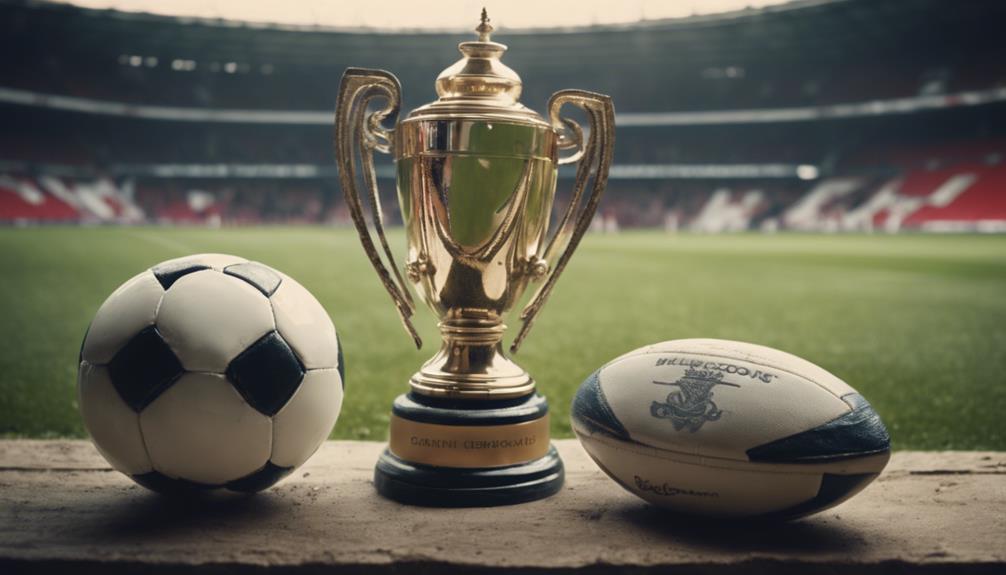
The Evolution of England Soccer: Key Milestones
July 30, 2024From medieval origins as 'futball' to The Football Association's rule standardization in 1863, England soccer evolved through significant milestones. The creation of the English Football League in 1888 set the global pace with the world's first national league. Major events like the FA Cup and England's 1966 World Cup win marked pivotal points. Alongside cultural impact, the sport stands as a beacon of national unity, echoed in music, art, and more. Each milestone plays a part in shaping a rich soccer history, where past actions influence current glories.
Early Origins of English Football
Dating back to the medieval period, evidence of football-like games in England, referred to as futball, marks the early origins of English football.
The game gradually evolved, with Eton College in England playing a pivotal role by establishing early football rules in 1815. These rules laid the foundation for the development of the modern game of soccer.
Over time, the sport gained popularity and formalization, leading to significant milestones such as the formation of The Football Association (FA) in London in 1863. The establishment of the FA not only organized the sport but also standardized the rules, setting the stage for the first-ever soccer match.
This event marked an important moment in the history of English football, paving the way for further developments like the creation of the English Football League (EFL) in 1888, which became the world's first national league system.
The origins of English football, rooted in medieval futball and shaped by institutions like Eton College, ultimately set the groundwork for the modern game we're familiar with today.
Development of Modern Soccer Rules
The development of modern soccer rules was a pivotal moment in the evolution of English football, shaping the game into a structured and regulated sport.
In 1863, the Football Association (FA) in England published the first official set of soccer rules, which included the critical prohibition of handling the ball, thereby distinguishing soccer from rugby.
These standardized rules established by the FA played an important role in the growth and organization of the sport, providing a framework for an organized, structured, and regulated game.
The FA's rules not only set the groundwork for modern soccer but also played an essential role in shaping the global spread of the sport. By providing a universal set of regulations, the FA facilitated the standardization of soccer, enabling its widespread adoption and popularity worldwide.
The structured and regulated nature of the game, thanks to the FA's rules, has been instrumental in fostering the growth and development of soccer into the globally beloved sport it's today.
Growth of English Football Leagues

With the establishment of the English Football League (EFL) in 1888, a pivotal moment marked the professionalization and popularization of football in England. The EFL, as the first national league system globally, played a significant role in professionalizing football and turning it into a widely followed spectator sport.
Over the years, the introduction of the Premier League in 1992 further elevated the status of English football, making it one of the most popular and financially lucrative leagues worldwide. Alongside the league competitions, the FA Cup, established in 1871, stands as the oldest football competition globally, adding to the rich tapestry of English football history.
The growth of English football leagues not only reflected the sport's significance within English society but also its role as a cultural force that fostered national pride. The leagues have become a cornerstone of English culture, shaping the nation's identity and uniting millions of fans in celebrating the beautiful game.
Major Competitions and Events
Hosting a myriad of significant competitions and events, England's soccer landscape is vibrant and filled with historical significance. The FA Cup, dating back to 1871, holds the title of being the oldest football competition globally.
On the other hand, the Premier League, established in 1992, has become one of the most renowned and financially lucrative leagues in the world. The England national team has left its mark on the international stage, winning the FIFA World Cup in 1966 and reaching the semi-finals in 1990, 2018, and Euro 2020.
Additionally, England made it to the semi-finals of the UEFA European Championship in 1968 and 1996. Apart from these prestigious events, other competitions like the League Cup and Community Shield further enrich the football history in England. These events showcase the passion and excellence that define English soccer and continue to captivate fans worldwide.
Impact of English Soccer on Culture

English soccer's profound influence on culture is undeniable, shaping societal norms and inspiring creativity across various artistic mediums. The impact of English soccer on culture can be seen in various aspects of society, including:
- Soccer in England serves as a significant source of entertainment, offering fans an escape from everyday life.
- The sport fosters national pride and unity, bringing together individuals from diverse backgrounds under one common passion.
- English soccer inspires creative expressions in music, art, literature, films, and TV shows, showcasing its influence across different artistic platforms.
- The popularity of soccer highlights its central role as a cultural phenomenon with a rich history and tradition.
Conclusion
As you reflect on the evolution of England soccer, you can see how it has come a long way from its humble beginnings.
From kicking a pig's bladder to the modern game familiar today, English football has truly been a game changer.
So next time you watch a match, remember that every goal scored is a result of the rich history and legacy of this beloved sport – the ball is in your court to keep the tradition alive!


